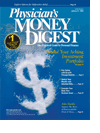Doctors Have to Believe in Miracles
A new poll of America's physiciansshows they believe in"miracles."I should hope so.The business of life and deathshould possess a mystical element.
I usually don't address matters of personalfaith in these columns, but since Iconsider myself a blessed person, Ithought I'd ponder a little. This nationalsurvey of 1100 US physicians, conductedduring the recent holidays by HCDResearch and the Louis FinkelsteinInstitute for Religious and Social Studies,found that 75% of doctors believe thatmiracles have occurred and can occur.
I asked my physician-dad if hebelieved in miracles, and he said, withouthesitation, "Yes."My father, who treatedpatients for 50 years and raised eight children(talk about your miracles?), placedthe advent and use of antibiotic drugs inthe realm of worldly wonder.
Help from Above
"I remember in the 1950s as a youngintern, right around the time of the introductionof sulfa drugs, we had this youngsoldier who was racked with meningitis,"my dad said. "We gave him the medicineand the doctors were astonished by theresults. He made a complete recovery in 2days, and without those drugs, he wouldhave been a dead duck."
Although it took time, effort, andcourage to develop and administer thosedrugs, my father believes that the endresult was "miraculous"and helped tousher in the era of progressive health care."If you care to look, it's easy to see themarvels of medicine today,"Dad said."But back then, for me and the doctors Iworked with, it was just amazing. We, astrained doctors, couldn't help thatpatient—it was the medicine that did."
Seeing "God"
Thus, belief in miracles must meanbelief in an outside entity more powerfulthan ourselves. The poll also indicatedthat doctors are surprisingly religious,with 72% agreeing that religion providesa reliable and necessary guide to life.Those surveyed represent physicians fromChristian, Jewish, Muslim, Hindu, andBuddhist religious traditions.
It's quite logical to assume that byvirtue of the various career challengesthat doctors face today (ie, medical malpractice,declining authority and compensation,and managed care stresses), manyare looking for something divine to helpthem along the path of life—professionallyand personally.
"Sometimes things happen in medicinethat you just can't control so youneed to talk to God about it,"a veryreflective Dr. Kelly explained to me. "ButI've learned that while he does always listen,he won't always respond."
